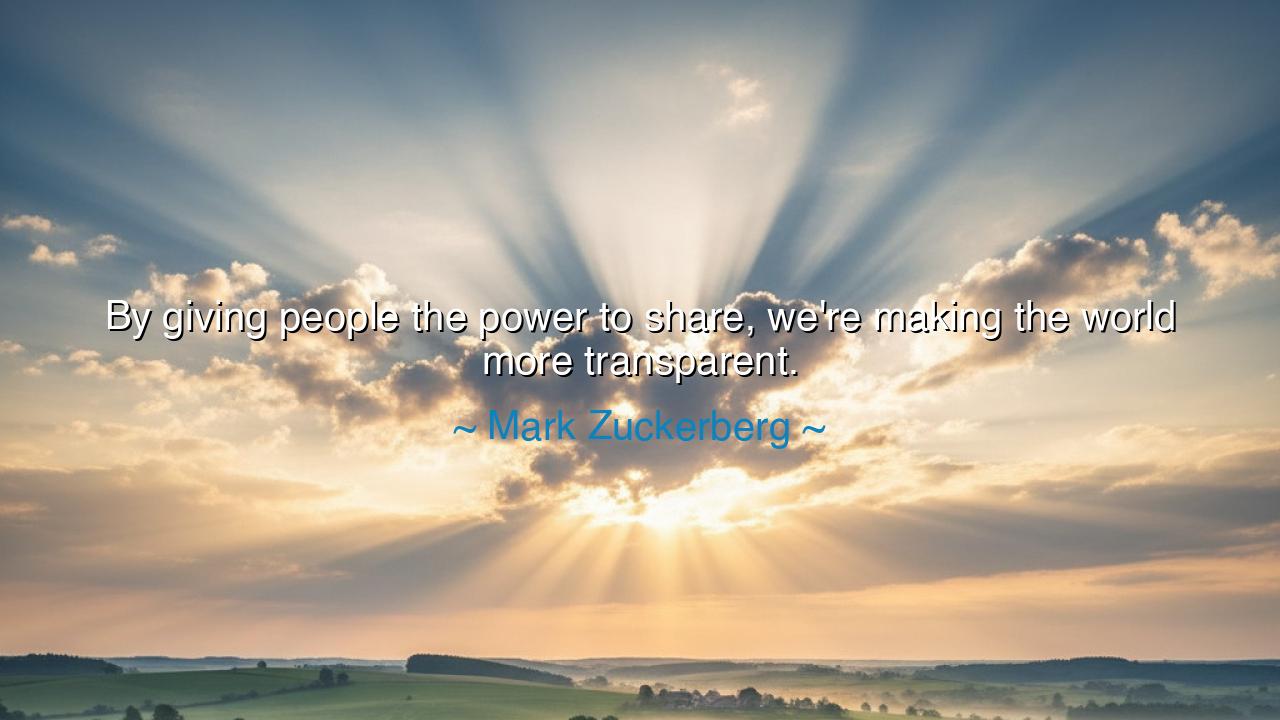
By giving people the power to share, we're making the world more






The creator of vast digital realms, Mark Zuckerberg, once declared: “By giving people the power to share, we’re making the world more transparent.” In this saying he exalts the act of sharing as a force that pierces the veils of secrecy. To grant men and women the power to reveal their thoughts, their stories, their lives, is to tear down walls that once divided, and to replace them with windows of light. Through this openness, transparency spreads, and the world becomes less a labyrinth of shadows and more a dwelling of mutual sight.
The origin of this wisdom lies in the rise of social networks, where voices once confined to small circles suddenly resounded across nations. Zuckerberg, founder of Facebook, believed that the act of sharing—of speaking openly, of revealing truths once hidden—would change not only how people communicated but how they trusted, governed, and lived. He envisioned a world in which transparency would weaken corruption, dissolve isolation, and bind humanity more closely together.
History gives us echoes of this principle. When Martin Luther nailed his Ninety-Five Theses to the church door in Wittenberg, his words, carried by the printing press, gave people the power to share ideas beyond the reach of priestly control. The result was a new transparency, where truth could be debated by the many rather than guarded by the few. Just as Gutenberg’s press shattered barriers of silence, so too Zuckerberg’s platforms sought to unleash the voices of multitudes.
The ancients also understood the transforming force of sharing. The Greeks gathered in the agora, where every citizen could speak, creating a measure of transparency in the affairs of the polis. The Hebrews, by preserving their law and history in sacred texts, ensured that their covenant was not hidden in the minds of priests alone, but open to all generations. Wherever the power to share was granted, light overcame shadow.
Therefore, O seekers, heed this teaching: to share is to strip away illusion, to open the heart of one to the many, and to make hidden truths visible. Yet remember also that transparency is double-edged—it can build trust, but it can also expose wounds. Use this power with wisdom, neither withholding light nor casting it carelessly, for once the world sees, it cannot unsee. In this balance lies the future: a humanity bound not by silence, but by the courage to live openly.






AM16. Anh Mai
I find this quote thought-provoking regarding global awareness. Could the ability to share empower marginalized voices and increase societal transparency, or does it also create echo chambers where only certain narratives dominate? How can technology strike a balance, ensuring that sharing promotes honest, diverse perspectives while minimizing manipulation or polarization?
KTDinh Khanh Thu
I’m curious about the psychological impact of this power to share. Does knowing that everything can be observed make people act more responsibly, or does it encourage performative behavior aimed at social approval? How do we distinguish between genuine transparency and curated self-presentation in digital spaces? I’d like perspectives on how sharing shapes both individual behavior and collective understanding.
TLDinh Thuy Linh
This raises questions about accountability. Does giving people the ability to share naturally lead to more ethical behavior from organizations, governments, or influencers, or is transparency only meaningful when coupled with critical thinking and regulation? I’d like to explore real-world examples where mass sharing has led to positive systemic changes versus situations where it caused confusion or harm.
TVLe Thi Thanh Van
I feel both inspired and skeptical by the idea of transparency through sharing. Could the concept of openness be culturally or contextually relative, meaning that what one person considers transparency might be intrusive or manipulative to another? How do societal norms influence what gets shared and how honesty or authenticity is perceived online?
KATran Thi Phuong Kieu A9
This makes me reflect on the balance between transparency and privacy. While sharing can promote openness, it can also expose individuals to scrutiny, harassment, or misuse of personal information. How can platforms ensure that empowering users to share doesn’t inadvertently compromise safety or ethical boundaries? I’m curious about practical safeguards that maintain both transparency and user protection.